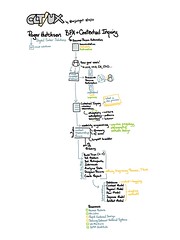As I’ve been working on this magazine/project – answering of a question – a good chunk of what comes out isn’t so much about the technology or behavior of mobile and its ministry intersection, but about the pieces which goes into answering what makes the most sense about the context around those streams. Ethnography is very much a core discipline within this endeavor.
…Taylor claims that the secret behind Starbucks’ appeal is the incredible amount of control it exercises over its image. All decisions start and end with the company’s ringleader, Howard Schultz. Everything at Starbucks is planned. It is not just a Starbucks’ coffee that you get when you walk through the café doors; it is a Starbucks’ experience.
It was after careful psychological research that the company first decided to have white cups with green writing, “tall” lattes, natural materials, and round tables. Starbucks interviewed hundreds of coffee drinkers, seeking what it was that they wanted from a coffee shop. The overwhelming consensus actually had nothing to do with coffee; what consumers sought was a place of relaxation, a place of belonging. They sought an atmosphere…
Starbucks is a familiar experience to many pastors I know – some of you might even be at Starbucks or a similar coffee shop while reading this. The environment is just as key to understanding mobile as is the technology or your content. What Starbucks has done has been often talked about, but in reference to mobile ministry, rarely practiced.
Some of the most immersive experiences in mobile ministry come from ethnographic-based approaches. And in an opposite view, the reason why we see so many of the same approaches to the same problems is because while there are plenty of builders of tunnels, there aren’t as many students of roads.
It’s still so frustrating to see how many companies embark on their redesigns or MVPs without doing contextual research first. You might get the usability of your product right, but without utility, it will still be useless.
Its probably safe to say that many folks miss doing that part of the project that asks for research and analysis. Asking questions is an important first step here. Then we can build or lead into fuller experiences of Christ by mobile or any context.
